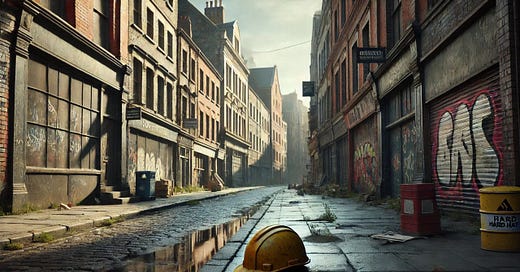The void left behind
On 10 May 2016, my beloved West Ham United played Manchester United in their last ever match at the ground they’d called home since 1904. The Boleyn Ground was scheduled for demolition and the club, controversially, was relocating a mile or two up the road to the London Stadium in Stratford.
In the 80th minute of the game, with the teams level at 2-2, West Ham’s Kiwi defender Winston Reid rose majestically to head home the winning goal. That detail has nothing to do with this story - I just wanted to remind all the Manchester United fans out there.
That was the 2,398th and final game played at the ground. The stadium was demolished by Rye Demolition just a few months later.
Despite concerns over the club’s relocation, the fan base remained loyal. In fact, home attendance at the London Stadium is way larger today than at the old ground.
But the impact upon local businesses around the old ground was devastating. The shops that sold West Ham hats, scarves and replica shirts died through lack of footfall and because they couldn’t afford the rent near the new stadium. The numerous burger vans that gave the approach to the Boleyn Ground its unique aroma couldn’t afford the licenses at the London Stadium. They too folded. Most devastating of all, to me at least, Nathan’s Pies & Eels in Barking Road closed its door two years after West Ham moved away. The traditional old pie and mash shop had been in the same family for more than 80 years; and it was an integral part of my countless visits to the ground.
I have been thinking of that recently in relation to the number of demolition and construction companies that have fallen or been forced out of business in the last few years.
When a demolition or construction company folds, we all talk about the impact upon the workforce and on the supply chain. Depending upon the circumstances of the collapse, we occasionally spare a thought for the directors who have just seen their life’s work crumble before their eyes.
But the fallout from such a collapse is felt way beyond the employees and their immediate supply chain. In fact, like the West Ham departure, it can rip the very soul out of a local community.
In some instances, a demolition or construction company is the biggest local employer. It is not unusual for those companies to employ fathers and sons, mothers and daughters, cousins, nieces and nephews and grandchildren. A company collapse could impact multiple generations of the same family.
Even if that’s not the case, a collapse can undermine a local town or village. The cafe just up the road where the workers and directors often met for breakfast or a mid-morning coffee suddenly sees its customer base gone. The local newsagent where workers stopped off for energy drinks, Mars bars and packs of cigarettes can suddenly go hours without seeing a single customer. The local hairdresser where workers popped in for a trim. The little fabrication firm that had fixed and refurbished buckets. The tyre and exhaust garage down the end of the street that kept both company and private vehicles roadworthy. The sign-writer that always did the company’s machines and vehicles; the hydraulic hose company; the printing firm that supplied all the company’s stationery; and the pub where workers and managers would meet on a Friday night to toast a week’s work well done.
Think about that on a larger scale. When ISG folded, so did numerous regional offices. In all likelihood, it took with it dozens or even hundreds of sub-contractors, each of whom made a vital contribution to their local area. ISG, and others like it, were the epicentre of the collapse. But the tremors may have been felt miles away. And even those that survived the initial quake may ultimately succumb to the aftershocks.
At the time of writing this, the UK construction company has lost around 5,000 companies of various sizes in the past 12 months or so. We know that because each company failure is logged and lamented.
What those records don’t show are the countless nameless and blameless victims that were left behind when construction left town.
When we talk about the collapse or failure of a demolition or construction company, we do so in isolation; like it is just that company, its employees and its direct supply chain that are impacted.
In truth, that silent collapse might be felt for miles around. And many of those impacted will never recover.





